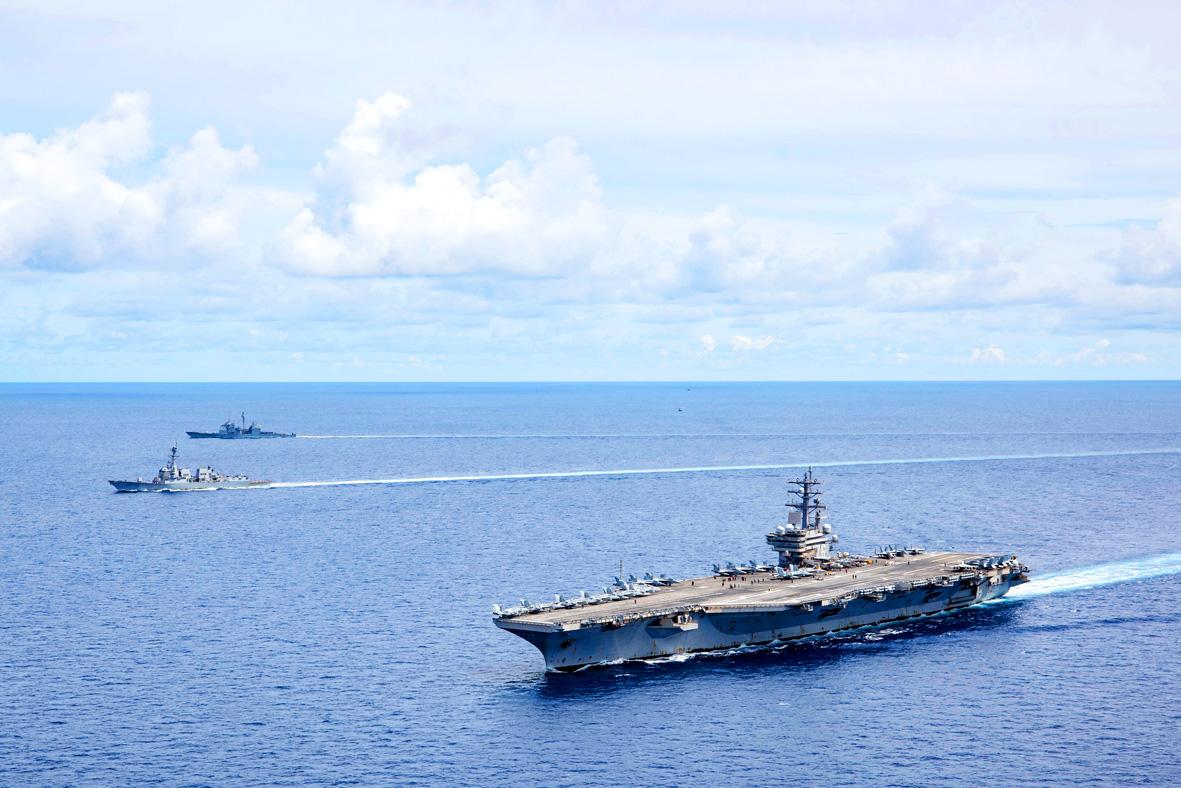The USS Mustin, an Arleigh Burke-class guided-missile destroyer, sailed through the Taiwan Strait yesterday, the 12th time this year that a US warship transited the waterway.
The US 7th Fleet said in a statement that the Mustin conducted a routine transit in accordance with international law.
“The ship’s transit through the Taiwan Strait demonstrates the US commitment to a free and open Indo-Pacific. The United States military will continue to fly, sail and operate anywhere international law allows,” the statement read.

Photo: EPA/EFE
The Ministry of National Defense said that the US vessel entered the Strait from the north and headed south.
Taiwan University associate professor of political science Chen Shih-min (陳世民) said that the US Navy is conducting warship transits through the Strait to support freedom of navigation in waters near Taiwan and its national security.
The transits show that the US would not tolerate China’s behavior of circling Taiwan’s territorial waters and airspace with warships and military aircraft, or its attempt to transform the Strait into Chinese territory, he said.
US warships sailed through the Strait nine times last year.
Institute for National Defense and Security Research assistant research fellow Jeremy Hung (洪子傑) said that the higher number of US transits this year reflects the US-China competition for influence in the region.
“In addition to warships, US military aircraft have also carried out more fly-bys in the airspace [around Taiwan] with their IFF [identification friend or foe] systems turned on, a move that is calculated to telegraph their presence to other countries and send a political message,” he said.
The previous time a US warship navigated the Strait was on Nov. 21.
The US 7th Fleet in a Facebook post the same day identified the ship as the Arleigh Burke-class guided-missile destroyer USS Barry.
“The ship’s transit through the Taiwan Strait demonstrates the US commitment to a free and open Indo-Pacific. The US Navy will continue to fly, sail and operate anywhere international law allows,” the post said.
“The United States and Taiwan are strong partners in defending freedom, advancing economic ties, and promoting our shared democratic values. The American Institute in Taiwan Economic Prosperity Partnership Dialogue strengthens our economic relationship even further,” US Secretary of State Mike Pompeo wrote on Twitter the same day.

The Ministry of Foreign Affairs (MOFA) yesterday said it is closely monitoring developments in Venezuela, and would continue to cooperate with democratic allies and work together for regional and global security, stability, and prosperity. The remarks came after the US on Saturday launched a series of airstrikes in Venezuela and kidnapped Venezuelan President Nicolas Maduro, who was later flown to New York along with his wife. The pair face US charges related to drug trafficking and alleged cooperation with gangs designated as terrorist organizations. Maduro has denied the allegations. The ministry said that it is closely monitoring the political and economic situation

Conflict with Taiwan could leave China with “massive economic disruption, catastrophic military losses, significant social unrest, and devastating sanctions,” a US think tank said in a report released on Monday. The German Marshall Fund released a report titled If China Attacks Taiwan: The Consequences for China of “Minor Conflict” and “Major War” Scenarios. The report details the “massive” economic, military, social and international costs to China in the event of a minor conflict or major war with Taiwan, estimating that the Chinese People’s Liberation Army (PLA) could sustain losses of more than half of its active-duty ground forces, including 100,000 troops. Understanding Chinese

UNRELENTING: China attempted cyberattacks on Taiwan’s critical infrastructure 2.63 million times per day last year, up from 1.23 million in 2023, the NSB said China’s cyberarmy has long engaged in cyberattacks against Taiwan’s critical infrastructure, employing diverse and evolving tactics, the National Security Bureau (NSB) said yesterday, adding that cyberattacks on critical energy infrastructure last year increased 10-fold compared with the previous year. The NSB yesterday released a report titled Analysis on China’s Cyber Threats to Taiwan’s Critical Infrastructure in 2025, outlining the number of cyberattacks, major tactics and hacker groups. Taiwan’s national intelligence community identified a large number of cybersecurity incidents last year, the bureau said in a statement. China’s cyberarmy last year launched an average of 2.63 million intrusion attempts per day targeting Taiwan’s critical

‘SLICING METHOD’: In the event of a blockade, the China Coast Guard would intercept Taiwanese ships while its navy would seek to deter foreign intervention China’s military drills around Taiwan this week signaled potential strategies to cut the nation off from energy supplies and foreign military assistance, a US think tank report said. The Chinese People’s Liberation Army (PLA) conducted what it called “Justice Mission 2025” exercises from Monday to Tuesday in five maritime zones and airspace around Taiwan, calling them a warning to “Taiwanese independence” forces. In a report released on Wednesday, the Institute for the Study of War said the exercises effectively simulated blocking shipping routes to major port cities, including Kaohsiung, Keelung and Hualien. Taiwan would be highly vulnerable under such a blockade, because it